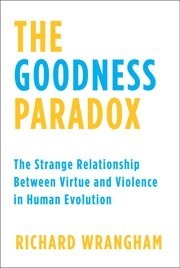Melvin Konner in The Atlantic:
 DeVore had hanging in his office an 1838 quote from Darwin’s notebook: “Origin of man now proved … He who understands baboon would do more towards metaphysics than Locke.” It’s an aphorism that calls to mind one of my favorite characterizations of anthropology—philosophizing with data—and serves as a perfect introduction to the latest work of Richard Wrangham, who has come up with some of the boldest and best new ideas about human evolution.
DeVore had hanging in his office an 1838 quote from Darwin’s notebook: “Origin of man now proved … He who understands baboon would do more towards metaphysics than Locke.” It’s an aphorism that calls to mind one of my favorite characterizations of anthropology—philosophizing with data—and serves as a perfect introduction to the latest work of Richard Wrangham, who has come up with some of the boldest and best new ideas about human evolution.
In his third book, The Goodness Paradox: The Strange Relationship Between Virtue and Violence in Human Evolution, he deploys fascinating facts of natural history and genetics as he enters a debate staked out centuries ago by Thomas Hobbes and Jean-Jacques Rousseau (among other philosophers), and still very much alive today: how to understand the conjunction of fierce aggression and cooperative behavior in humans. Why are we so much less violent day-to-day within our communities (in pretty much all cultures) than our closest primate relatives, chimpanzees, are within theirs? At the same time, how is it that human violence directed toward perceived enemy groups has been so destructive?
More here.
